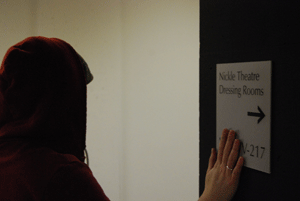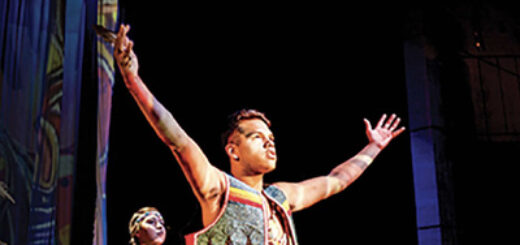How to play while you’re away
by Michael Bull
Theatre is a demanding profession, to say the least. Not to take anything away from any other courses Mount Royal offers, but few demand so much not only mentally, but physically as well. Yoga, calisthenics, deep

Photo by Michael Bull. Actors both professional and amateur find their choices limited when pursuing theatre opportunities during the off-season.
breathing and, most of all, an assured sense of self are not only required, but also demanded.
With summer fast approaching, the theatre students of Mount Royal University are venturing out of the comfy confines of their hallowed halls, and for the first time will venture forth into the unknown and often scary world of professional theatre.
Glenda Stirling, an instructor for the performance department for a number of years, understands the focus required for students to maintain discipline over the summer months.
“They are definitely encouraged to continue their breathing and movement, because once they come back it’s really hard if you haven’t done anything for four months,” says Stirling. “What we really do though, is try to encourage them to read plays. Not only in terms of material for their monologues, but just keeping that actor mindset.”
Simon Burke can’t help but agree. A former theatre student himself, he witnessed first-hand the effects of a lackadaisical regimen and laments what could have been. “I definitely read plays,” he remembers. “I read Waiting for Godot and some other one that I can’t remember, but unfortunately that’s all I did.”
With classes specializing in movement and voice and an emphasis on not only mental acuity but physical well-being as well, even a tenure as short as a few months can have a devastating effect on the performance of an actor if they don’t practice during their off time.
Burke says: “It’s kind of stupid now to think about it, but discipline is huge in terms of acting, and I stopped all my breathing exercises and didn’t do any vocals or anything, so when I came back I was basically a giant blob. To come back from that after everybody else kept at it all summer was just impossible. So I dropped out.”
Adds Stirling: “You can definitely tell [which] students keep on top of their game. They come back and they are just pretty much really good to go. You have to keep moving. We encourage them to keep acting or take a recreational dancing class. There are one-day incentives or multi-day workshops that help them maintain that focus over the summer.”
This summer the theatre department, specifically the performance side, is advertising audition workshops by award-winning performers and, like always, are pushing students to get involved in the theatre scene in Calgary.
Kelsey Ledbury is a stage manager working on plays all across the city. An alumnus of the theatre program with a focus in technical, she thinks that while the technical side may not be as physically demanding as the performance side, they still have to go out and get involved.
“We were told to go volunteer and to usher wherever we could,” says Ledbury. “A lot of us were pushed to do Shakespeare in the Park, since that has a direct connection to the department. It’s not to say I did, but the opportunity was definitely there. I actually went back to my high school and worked on their musical, so that was really fun.”
However influential the glamour of Shakespeare in the Park may be, Stirling is quick to point out that students have to go beyond that: “They can’t hire everybody.”
Adds Ledbury: “In terms of the technical department, they didn’t really say to keep constant contact with them, because I think they thought we were at an age that we could handle ourselves, but they helped a whole bunch. They would refer our name to outside companies and I would get a call and say, ‘I heard your name from Robin, I heard your name from so and so.’ That was always nice.”
With such a close-knit program, it is common to hear students calling teachers by a first-name basis, and teachers taking a personal interest in the students they are teaching.
“We are extremely specialized,” says Stirling. “At the end of the first year (it’s a two-year program), we have a one-on-one teacher/student evaluation that everybody goes through, and it’s quite remarkable that in terms of how everybody is in the same ballpark, so to speak, they are all still on different levels. I might tell one student they need to work on calisthenics or another student to work on breathing, so it’s different for every student in terms of what they need to do to not only maintain but grow and mature.”
Telly James, another product of the Mount Royal theatre department, has a slightly different opinion. James graduated from the program in 2007 and has had a steady diet of work since, but his route has had less self-imposed roadblocks than most.
“People take themselves too seriously,” says James. “I never did anything like that. I didn’t really do anything. I took the break as a blessing and did my own thing. Maybe I’m just lucky, but when I came back I was still really focused. Maybe I was just focused on getting through it, but still. Maybe I’m a hater. I did the opposite.”
James believes that regardless of the amount of hard work one does over the break period, if you want to do it, and you want to do it for life, the rest will follow.
“It’s just life man,” says James. “If people want to see you and if you want to make yourself seen, then you will. I try not to think about it too much.”
Different opinions aside, the students aren’t the only ones that need a break. After eight months of vigorous teaching, the instructors of the theatre department can’t deny the chance for rest and relaxation. However, it doesn’t mean they are taking time off.
“We encourage students to contact us if they need anything at all, and most do, but in all honesty, we need a break too,” says Stirling. Ask and you shall receive.




